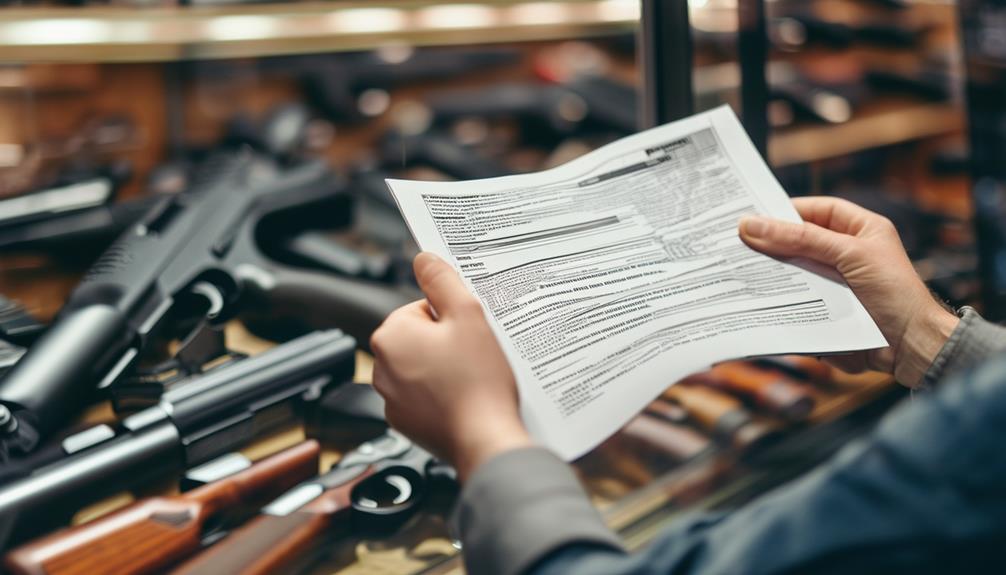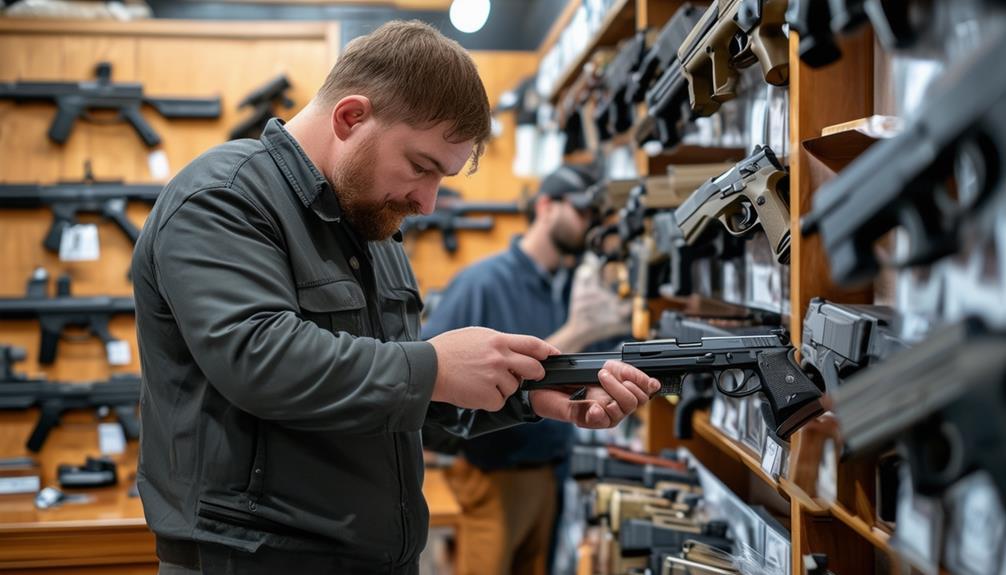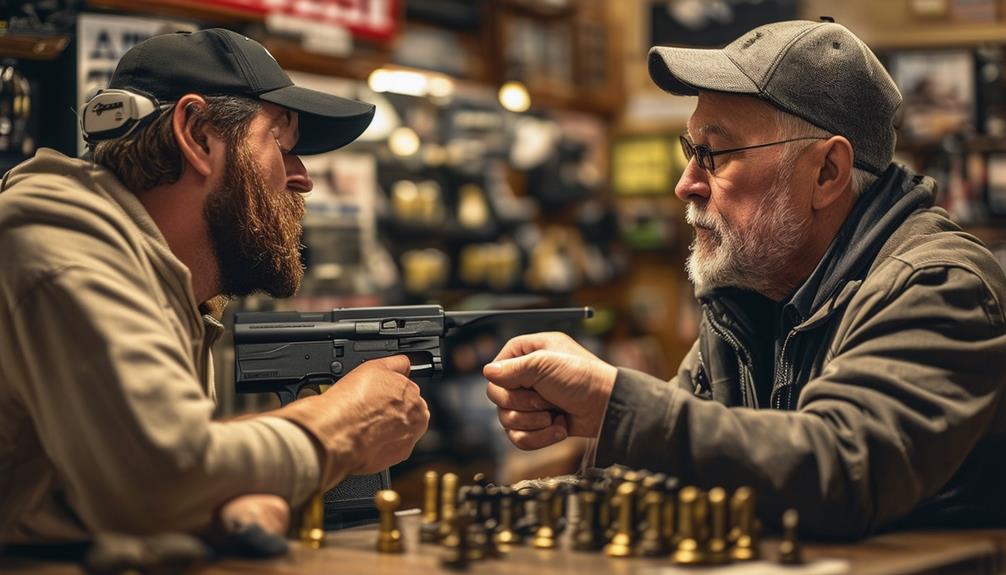Expert Advice on Selling Firearms at Pawn Shops
Expert Advice on Selling Firearms at Pawn Shops
When selling firearms at pawn shops, research policies, prepare firearms well, know their value, bring the required documentation, and negotiate wisely. Understanding the shop's rules and your gun's worth is crucial for a smooth sale. Properly maintaining and presenting your firearm increases its appeal to potential buyers. Having all necessary paperwork organized streamlines the process. Negotiating with confidence and preparedness improves your chances of getting a fair deal. Following these steps guarantees a successful transaction and maximizes your profit potential. Find out more about each step for selling firearms at pawn shops to enhance your selling experience.
Research Pawn Shop Policies

Studying pawn shop policies is important before contemplating selling firearms at these establishments. Policy comparison is essential to make sure you choose a pawn shop that aligns with your values and requirements.
Checking the owner background can provide insight into the shop's reputation and legitimacy. Legal compliance is a significant factor to take into account, as selling firearms involves strict regulations that must be followed.
Understanding the transaction process is crucial to guarantee a smooth and secure sale. By familiarizing yourself with these aspects, you can make an informed decision when selecting a pawn shop to sell your firearms.
Prepare Your Firearms Properly
Before taking your firearms to a pawn shop, it's important to make sure they are properly prepared. This includes thoroughly cleaning them to make them more appealing to potential buyers.
Additionally, documenting the history of your firearms can add value and credibility to your sale.
Clean Firearms Thoroughly
Properly preparing firearms by thoroughly cleaning them is essential before selling them at pawn shops. Proper maintenance and storage techniques are vital to guarantee that the firearms are in good condition and appeal to potential buyers.
Begin by disassembling the firearm according to the manufacturer's instructions. Clean all components using appropriate tools and solvents to remove any dirt, residue, or rust. Pay close attention to the bore, action, and exterior surfaces.
After cleaning, lubricate the moving parts lightly to ensure smooth operation. Properly storing the firearm in a secure and dry location will help maintain its condition until it finds a new owner.
Document Firearm History
To guarantee transparency and establish credibility, documenting the complete history of your firearms is essential before selling them at pawn shops. Providing a detailed history can help potential buyers feel more confident in the transaction and can also assist with any necessary background checks.
It's vital to be aware of gun laws related to selling firearms, as different states may have specific requirements. By documenting the history of your firearms, including information such as previous owners, purchase dates, and any modifications made, you can ensure a smoother selling process.
This documentation not only exhibits your commitment to following regulations but also helps pawn shops verify the legitimacy of the firearm, streamlining the selling process for all parties involved.
Know Your Firearm's Value

Understanding the value of your firearm is essential when selling it at a pawn shop. Knowing how to appraise your firearm, conducting market research to determine its current worth, and developing negotiation strategies will help you get the best deal possible.
Appraisal Process Tips
Knowing the value of your firearm is crucial before bringing it to a pawn shop for appraisal. To guarantee you get a fair deal, familiarize yourself with appraisal techniques and valuation tips.
Start by researching online platforms, such as gun auction sites or firearm marketplaces, to gauge the current market value of similar firearms. Take note of any unique features, brand reputation, condition, and rarity that can influence the price.
It's also beneficial to consult with experienced gun owners or appraisers to get their insights. By gathering as much information as possible, you'll be better equipped to negotiate a reasonable price for your firearm at the pawn shop.
Market Research Insights
Conducting thorough market research is crucial to accurately determine the value of your firearm before taking it to a pawn shop for appraisal. When researching pricing strategies, consider factors such as the firearm's brand, model, condition, and current market demand. Understanding customer demographics can also help you tailor your pricing strategy.
For example, antique firearms might appeal more to collectors, while newer models may attract enthusiasts looking for the latest features. By analyzing market trends and studying customer preferences, you can set a competitive price that attracts potential buyers. This knowledge will not only help you negotiate effectively at the pawn shop but also guarantee you receive a fair value for your firearm.
Negotiation Strategies for Firearms
To negotiate effectively when selling firearms at pawn shops, it is essential to have a clear understanding of the value of your firearm. Knowing the market value will empower you during the negotiation process. Here are some tips to help you navigate the negotiation successfully:
- Research Comparable Listings: Look for similar firearms online or in stores to gauge the market price.
- Set a Bottom Line: Determine your lowest acceptable price and stick to it.
- Be Mindful of Price Flexibility: Understand your price range and be open to negotiation within that range.
- Prepare Counteroffer Techniques: Anticipate counteroffers and decide how you will respond.
- Use Strategic Tactics: Employ tactics like bundling accessories or highlighting unique features to strengthen your position.
Bring Necessary Documentation
Before commencing the firearm sale process at a pawn shop, make sure you have all required documentation readily available. This includes documents for identification verification and background checks.
Typically, you will need a valid government-issued ID, such as a driver's license, to prove your identity. Additionally, for ownership verification and the transfer process, make certain you have any relevant paperwork confirming your ownership of the firearm. This may include a bill of sale, a firearm registration certificate, or any other documentation related to the gun.
Having these documents in order will help streamline the selling process and guarantee a smoother transaction at the pawn shop.
Negotiate Wisely

When engaging in negotiations for selling firearms at a pawn shop, it is important to approach the process with a clear understanding of the item's value and a realistic expectation of the potential sale price. Negotiate wisely by considering the following:
- Research Comparable Prices: Know the market value of your firearm.
- Be Prepared to Walk Away: Don't feel pressured into accepting a deal that doesn't meet your expectations.
- Highlight the Condition: Present your firearm in the best possible light.
- Use Polite and Assertive Communication Skills: Be clear and confident in your negotiations.
- Consider Bundle Deals: Offering accessories or ammunition can sometimes increase the overall value.
Understand Legal Requirements
Understanding the legal requirements associated with selling firearms at a pawn shop is essential to guarantee compliance with relevant laws and regulations. Before proceeding with any firearm transaction, both the seller and the pawn shop must make sure that a background check is conducted on the buyer. This check is important to verify the buyer's eligibility to own a firearm and is a legal requirement in many jurisdictions.
Additionally, comprehending the transfer process is key. This process involves completing the necessary paperwork to transfer the firearm from the seller to the new owner, ensuring that all legal requirements are met. By adhering to these legal requirements, pawn shops can conduct firearm sales responsibly and within the confines of the law.
Frequently Asked Questions
Can I Pawn a Firearm Without a Background Check?
When pawning a firearm, the transfer process typically involves a background check to ensure compliance with legal requirements. However, there may be exceptions and loopholes that vary depending on local laws and regulations.
It is important to understand the specific procedures and regulations in your area to guarantee proper compliance when pawning a firearm. Be sure to consult with local authorities or legal experts for guidance on this matter.
Do Pawn Shops Accept Antique Firearms for Sale?
While pawn shops typically accept a variety of items for sale, including firearms, the acceptance of antique firearms may vary. Before bringing in an antique firearm for sale, it is advisable to inquire with the pawn shop about their policies regarding such items.
When selling antique firearms, the appraisal process is essential to determine the item's value accurately. Professional appraisers at pawn shops can assess the authenticity, condition, and historical significance of antique firearms to provide a fair valuation.
What Happens if My Firearm Is Damaged While in Pawn?
If your firearm is damaged while in pawn, you should inquire about the pawn shop's liability policy. Some shops may have insurance to cover damages to items in their possession.
You can discuss potential firearm repair options with the pawn shop, depending on the extent of the damage.
It is crucial to clarify these details beforehand to make sure you are aware of the procedures and responsibilities in case of damage to your firearm while it is in pawn.
Are There Restrictions on Selling Collectible Firearms?
When selling collectible firearms, it is important to be aware of legal requirements such as ensuring compliance with local and federal laws.
The appraisal process is essential to determine the market value of the firearm accurately.
Insuring the collectible firearm can protect its value and offer peace of mind.
It's advisable to consult with experts in the field to guarantee a smooth and legally compliant selling process.
Can I Sell a Firearm That Was a Gift or Inheritance?
When selling a firearm that was a gift or inheritance, legal considerations and background checks are important.
Gift firearms can be sold, but it's vital to make sure the proper documentation is in place to establish ownership and legality.
In the case of inherited firearms, additional steps may be necessary to transfer ownership legally.
It's advisable to consult with legal professionals or firearm experts to navigate the process smoothly and avoid any potential legal issues.
Conclusion
To wrap up, when selling firearms at pawn shops, it is essential to:
- Research their policies
- Prepare the firearms properly
- Know their value
- Bring necessary documentation
- Negotiate wisely
- Understand legal requirements
Remember, 'knowledge is power.' By following these steps, you can guarantee a successful and smooth transaction when selling your firearms at a pawn shop.

